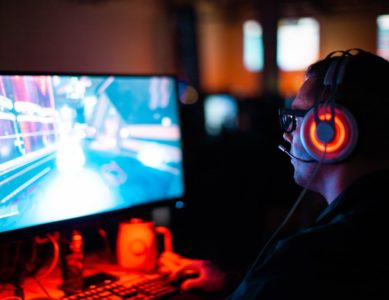Jessica Gulick possesses a unique vision: she has a wealth of experience in security and growth hacking. At the same time, she possesses an awareness of the power of the games to bring these two worlds together.
Last year, she helped roll out the Wicked6 Cyber Games tournament in Las Vegas. During RSA’s infosec-focused conference in San Francisco, she will moderate a morning panel discussing the potential of competitive games and cyber security working together.
I had the opportunity to find out some of her thoughts on her work, what was accomplished at the Wicked6 tournament last year, and what will be accomplished at RSAC 2020 and beyond. (This Q/A is lightly edited for clarity.)
Events for Gamers (E4G): Jessica, thanks for sharing your thoughts and insights through this Q/A with us and our audience. To start with, tell us a little about your work in cybersecurity and how you became involved with Women’s Society of Cyberjutsu (WSC) — especially about how you involved competitive gaming into your work.

Jessica Gulick: My love for gaming started many decades ago. I love sports — basketball. Being on a team has taught me a lot in life. While working as a program manager in cyber for a wide variety of professionals (pen testers, forensic, policy wonks, and assessors), I learned that in real life cybersecurity is a team sport. But it was being a part of the very first pilot of Cyber Patriot with SAIC’s leads at the time — Scott Kennedy and Duke Ayers — that I fell in love with cyber as a sport. Over the next few years, I had the honor of assisting these brilliant pioneers bring games across the US to high schoolers, middle schoolers, and college students.
Then came the first Maryland Cyber Challenge and Conference (MDC3) when it truly hit me that competition/games can change lives. I was so tired with feet throbbing so I sat down at a table across from the players and was joined by a stranger. He shared with me how only 6 months previous his son was lost. Head always in his video games, no friends, no future. Then he found a crew and started to disappear more and more. The man teared up as he shared that just a few days previous his son opened up and told him that he was part of cyber team competing at MDC3. For weeks, they had been practicing and learning computers. On the way to the show, he shared with his dad that he really want to win the scholarship money as he wants to get a degree in cybersecurity. This 6’4 middle-aged guy just stared at his son from the table as he said to me, “I wonder if they know how they are changing these kids’ lives.” I couldn’t speak, just nodded. This is why I am passionate about cyber as a sport, as a game.
Over the years since, I have done many things not related to cyber games but I have always been aware of the market shifts. About a year ago, a friend and fellow believer, Dan Manson hijacked me on a trip to Vegas for work. “I have to show you something, Jess.” He took me to the HyperX arena where Fortnite launched. It took less than 5 minutes, 10 questions and a phone call. We just knew we needed to put on a “cyber meets esports for a cause” game. Wicked6 was born.

E4G: Given the synergy between many aspects of cybersecurity and games/esports, do you feel there’s misunderstandings between these businesses and their respective professionals? How can they better understand and work with each other?
Jessica: Misunderstandings no. Just limited vision. Gamers are a key part of cybersecurity. When I was a program manager hiring cyber security positions, asking: “What games do you play?” was a standard interview question. Gamers live in a world of continuous discovery and trying new things. Esports in particular requires team skills, communication, and competitive behaviors – so does cybersecurity jobs. The main differences are being overcome slowly — cybersecurity is a boring sport because it lacks visualization. This is why I have reengaged. The market is ready for an evolution of cyber games. We are ready to move past boring, safe networks where we can safely hack things. We are open to games beyond red versus blue.
E4G: From your perspective, can serious gaming tournaments effectively help the game development and cybersecurity industries be better able to welcome STEM students from women and other underrepresented backgrounds into their fields? Are there other means of engagement you’d also recommend?
Jessica: I am betting my future on that, specifically. Cybersecurity, from commercial protection to national defense, can only evolve significantly with gaming tournaments. Competition builds the best professionals, tactics, tools, intelligence. Our community needs to have a safe and challenging place to hone our skills. 2020 is not 1990. Back then hacking was a cult thing…but not really illegal — or at least not well enforced. Today is different — we have code of conducts, laws, and better defenses to detect and enforce laws. We absolutely don’t want folks trying to hack commercial planes but we need to know if it can be done and how. Competition and games enables us to innovate, try new things, experiment, collaborate and hack. We need an arena to let loose, have fun, and learn from each other. That’s my dream or at least part of it.
As for diversity and games, it’s interesting. Diversity can be a big challenge for team work but it is a required element of innovation. One of last year’s teams shared how they added a girl to their team to comply with our rules. It added a nice spark to their team but took getting used to. He reflected how they tried to address a challenge a number of ways, and the woman on the team interjected and had them take it back a few steps so they could approach it from a different path — it worked. It was then he understood the value of diversity on the team. Diversity comes in many ways, not just what you can see. You need diversity of thought, experience, skills, and more as a team to be strong. Games help teach the smartest among us that they may be great, but with a crew they can accomplish so much more.
E4G: Looking back for a moment, how successful was the Wicked6 Cyber Games WSC hosted last year? How might the event be different this year?
Jessica: Immensely — over 300 in person and thousands streamed online. It wasn’t perfect. There are always glitches with these competitions. But, at its heart, we proved cyber games can be fun to watch. I remember looking around and realizing the brilliant people in the arena watching college students (adults and kids) compete and talking about cyber things. CEOs, spooks, Netwars winners, DefCon winners, serial entrepreneurs, policy makers, governor, commercial executives. All there for the love of the cyber game. #mytribe.
This year will be better than ever. We are going to try to see if we can find a few juggernaut high-caliber pro teams to play a round. Just one round to give the students a break and add to the excitement. We are also playing with a draft/recruiting concept – more to come on that. Our focus is on creating the excitement, the fun of games, not trying to see if we can build a complex game.
Jessica Gulick’s Q/A interview continues on the next page.



